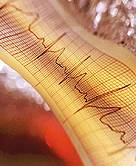- 7 Best Breads for Maintaining Stable Blood Sugar
- Gelatin vs. Collagen: Which is Best for Skin, Nails, and Joints?
- The Long-Term Effects of Daily Turmeric Supplements on Liver Health
- Could Your Grocery Store Meat Be Causing Recurring UTIs?
- Are You Making This Expensive Thermostat Error This Winter?
- Recognizing the Signs of Hypothyroidism
- 10 Strategies to Overcome Insomnia
- Could Artificial Sweeteners Be Aging the Brain Faster?
- Techniques for Soothing Your Nervous System
- Does the Water in Your House Smell Funny? Here’s Why
Implanted Defibrillators Restore Healthy Heart Function to Many: Study


Many heart patients are advised to receive an implanted cardiac defibrillator to keep their heart functioning properly.
Now, a new study of 1,200 people shows that, in many cases, these devices do their job very well.
Within a few years of receiving a defibrillator, heart function in one in four patients improved to the point that they were over the medical threshold that qualified them for a defibrillator in the first place, the study authors found.
These patients also had a much lower risk of death, the researchers said, so their defibrillators were now far less likely to have to deliver electrical shocks to correct heart rhythm problems.
The study included heart patients aged 18 to 80 with implanted defibrillators — devices meant to prevent sudden cardiac death from abnormal heart rhythm. None of them had suffered a cardiac arrest.
The study underscores the need to check up on the heart function of patients who get one of the devices, the researchers said.
There’s an “urgent need to refine the risk-benefit assessment [of having a defibrillator] in people repeatedly, over the course of their treatment, and not just at the time of device implantation,” senior researcher Dr. Alan Cheng, of the Johns Hopkins University School of Medicine in Baltimore, said in a university news release.
“Determining if patients with defibrillators whose hearts get better over time may be better off without the device is just as important as determining who needs a defibrillator in the first place,” said Cheng, who is a cardiac electrophysiologist and an associate professor of medicine at Hopkins.
One expert believes a longer study may be needed, however.
“The mean follow-up was approximately five years, but we do not know whether this improvement in [cardiac function] is durable and long-lasting, which must be taken into consideration,” said Dr. Stephan Danik, director of the Cardiac Arrhythmia Service at Mount Sinai Beth Israel in New York City.
According to the researchers, an estimated 8,000 to 10,000 heart defibrillators are implanted in patients in the United States every month.
The study appears in the Aug. 4 issue of the Journal of the American College of Cardiology.
More information
The U.S. National Heart, Lung, and Blood Institute has more about implantable defibrillators.
Source: HealthDay
Copyright © 2026 HealthDay. All rights reserved.










